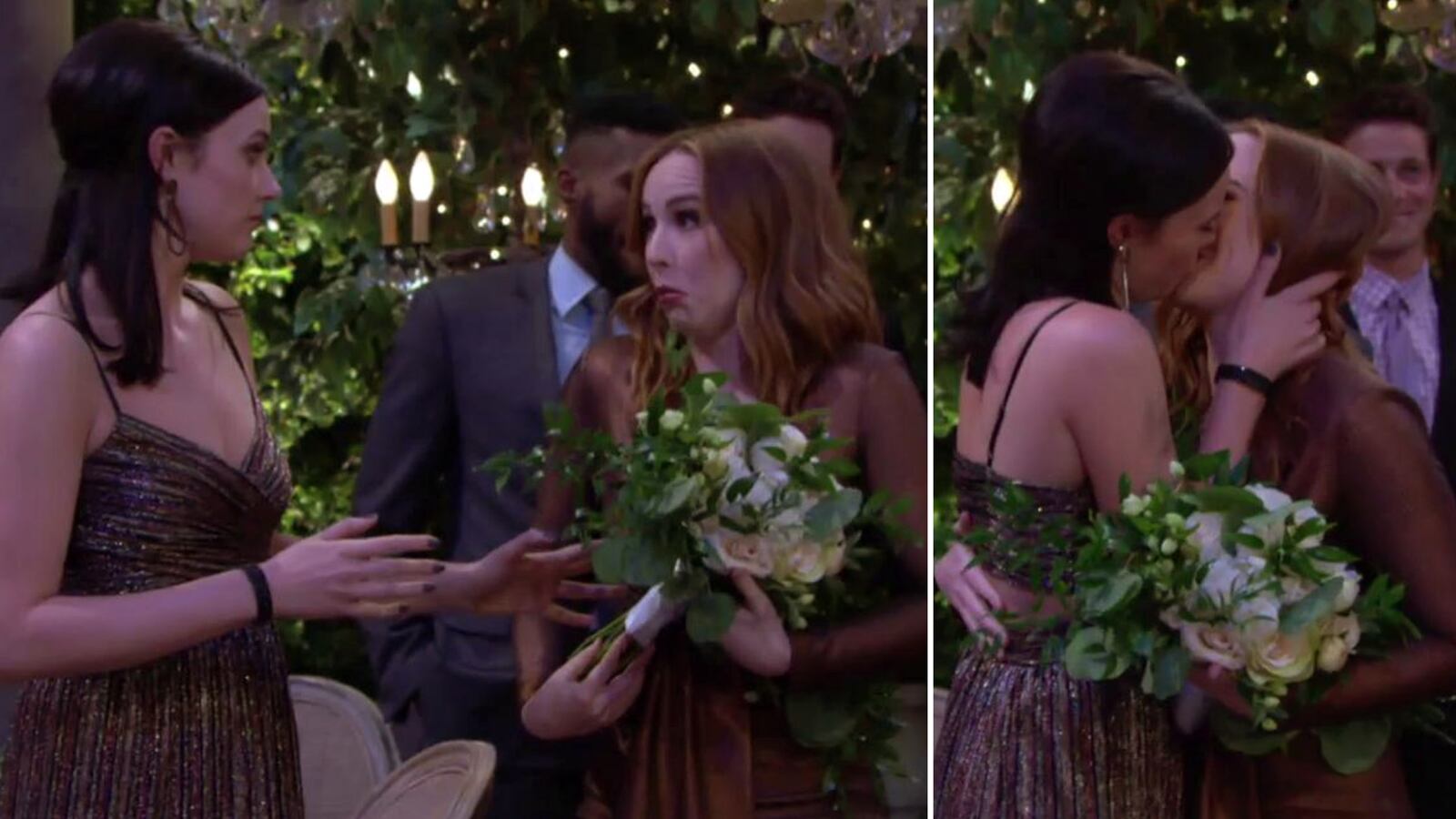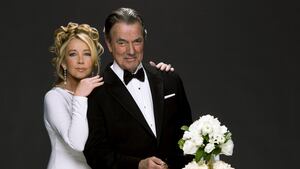One of the sweetest LGBTQ scenes on television so far this year happened on Monday, around lunchtime. You won’t have read about it. It was well away from the prestige marquees of HBO and Showtime, and the prime-time jewels of the major networks.
True, it didn’t have the thrilling, revolutionary swagger of FX’s Pose. But it was a brief, well-written, beautifully directed scene, with the crowning cherry of its LGBTQ import—and it happened on The Young and The Restless.
It was time for Lola Rosales (Sasha Calle) to throw her bouquet at the end of her eventful wedding to Kyle Abbott (Michael Mealor) on the CBS daytime soap. Fans’ minds and hearts are split over Kyle and Lola. They’re both beautiful and good, but coupledom and a fast-track to marriage have for now made them Genoa City’s most boring duo. Have they really gone through enough to be a true soap supercouple? Not yet.
And even though she’s been a total cow (until, suddenly, recently), Summer Newman (Hunter King), who loved Kyle so much she donated part of her liver to Lola (sorry, we don’t have time to explain this), is feeling hurt at how this has all shaken down.
Any soap opera fan knows that weddings rarely go off without a hitch, and this one featured Summer trying to come to terms with the union, a secret woman from Kyle’s past in New York—A Big City Where Bad Things Happen—reintroduced by villain Theo (Tyler Johnson), and the appearance of Lola’s allegedly no-good dad Adrian (Jay Montalvo). So, there were sighs of relief when the vows were exchanged—and so to the bouquet toss.
Lola threw it over her shoulder, and it landed in the hands of Abby Newman (Melissa Ordway), who looked down at it horrified, and threw it straight to Summer, who also looked appalled and threw it to her mother Phyllis (Michelle Stafford), who wasn’t having it either, and she threw it to Ashley (Eileen Davidson), who freaked out at having it in her hands and threw it to Mariah (Camryn Grimes), standing with girlfriend Tessa (Cait Fairbanks).
This bit of physical comedy was a blast in itself: Genoa City’s presently single women—Abby is dating cute Dr. Nate (Sean Dominic), though with caution—treated that bouquet with magnificent, rejecting, lip-curling contempt. The throwing of the bouquet is usually a competitive affair, with women fighting to grab it and hold it, and thereby win the superstition seal on being the next to get married.
But none of Genoa City’s single heterosexual female leads wanted that bouquet. All have been hurt by men, all know all too well the perils of marriage and coupledom. Just having the characters reject the bouquet was a treat, and something to cheer.
Mariah, standing with Tessa, did not throw the bouquet away, and so the next delicious moment of the scene unfolded.
Fans know them as “Teriah.” Mariah originally entered the show to play the ghost of Cassie, the dead child of Sharon (Sharon Case) and Nick (Joshua Morrow). It turned out, naturally, Mariah the not-ghost was Cassie’s twin, and once extricated from the evil fake apparition plot has become a popular character.
The writers, once they had decided to create a lesbian relationship in Genoa City, haven’t been very consistent with Mariah and Tessa. Tessa is a budding music star and also waitress, and also reformed con-woman. Mariah, post playing a ghost, became a TV chat show host turned public relations whizz, who recently played out the world’s shortest stalking storyline.
They fell in love while in relationships with men, and their relationship progressed in an odd, uneven pace. Only in recent months have Mariah and Tessa made fuller sense as a couple, and behaved like one, and it’s a testament to Camryn Grimes and Cait Fairbanks that even when they weren’t being written properly and fully, they have given “Teriah” the kind of spark that makes fans root for a soap couple.
There was a tender coming out scene involving Mariah and her mother Sharon that also rose above the usual soap opera conventions and histrionics.
And yet, Genoa City in 2019 remains, as daytime television still dictates, a conservative, mainly heterosexual place. The word “lesbian” or “gay” is rarely (if ever) mentioned on screen. Mariah and Tessa do not discuss being LGBTQ, or LGBTQ issues, or LGBTQ anything. There are apparently no other LGBTQ people in Genoa City to socialize with, or just roll their eyes at all the dysfunctional heterosexuals around them.
It’s a mystery what those in charge of Y&R and at CBS imagine Mariah and Tessa to be, and why the writing of them feels so cautious, when it’s clear fans like “Teriah” being together and being allowed to be as physically expressive as their straight counterparts.
It’s great the couple is in place, continuing a small but significant tradition of gay couples in daytime (from soaps now long past, like Olivia and Natalia in Guiding Light and Noah and Luke and later Noah and Reid in As The World Turns). But unlike Noah and Luke, for example, this is a gay couple for whom the word “gay” does not exist in their on-screen vocabulary.
Perhaps that signals a nervousness on CBS‘ part in how a mainstream audience would see them if “Teriah” were louder or prouder, and so they exist outside of any kind of identity. You could argue that is liberating, but it’s also puzzling, because no-one—not them, nor the other characters in Genoa City—ever address their sexuality.
Some would say that Y&R is its own universe of nutty, where such named realities would be deemed some kind of intrusion. Race and racism do not surface as topics or storylines, and can only sometimes be decoded in discussions of power and influence.
When Phyllis was being raped by a stranger for months and months (he was a doppelgänger of her then-husband), the show seemed nervous to call it what it was. Gina Tognoni, who was then (brilliantly) playing the character, gave Phyllis the sense of terrible violation and fury she rightly needed even when the script tentatively stepped around the R-word.
Mariah and Tessa being gay is as part of them as the taken-as-given heterosexuality of everyone else, yet its difference is glossed over and unspoken. In recent months, in private or in scenes with no one else around, Mariah and Tessa have at least been kissing more and been more physically affectionate than at their beginning when the coupling seemed based on one of the women being Mariah-sexual and the other Tessa-sexual, but not—gasp—lesbian or gay.
And so, back to the bouquet. Once hot-potato’d by Genoa City’s much-wronged heterosexual leading ladies, it landed in Mariah’s hands. She shrugged, Kyle shrugged. Someone said “aww”—I think Traci Abbott (Beth Maitland), who recently was imagining her lust object Cane Ashby (Daniel Goddard) as a film noir-ish detective in a romance novel she was crafting. (I tell you, Genoa City’s heteros are really weird.)
Mariah held the bouquet, then held and kissed Tessa. This was their first kiss in front of other members of the cast gathered en masse. The kiss was loudly cheered and applauded. And the women, refreshingly unbashfully, withdrew from the kiss, and looked like, “Yeah, you should be applauding that. It was great. We loved every lip-smacking moment of it.” It was great to see the kiss, the women together and in love, so centrally placed and acknowledged.
The moment—lightly played as it was—was also symbolic, underscoring the significance of marriage equality itself, and playfully, subversively alluding to a gay embrace of an institution heterosexuals eye with suspicion.
It was a lovely scene, and one hopes it points to a more open and declarative future for Mariah and Tessa—if they have a long-term future as characters in the show (there are online rumors Fairbanks is now off contract).
There’s a braver, bigger set of stories that could include elements of what being LGBTQ in America is like today, especially in an era where LGBTQ rights are so imperiled. Y&R star Greg Rikaart (Kevin) was a contributor to The Daily Beast’s Stonewall 50th anniversary coverage, eloquently expressing the evolution of his own pride and politics.
CBS’ concern may be that it doesn’t want to endanger audience affections for “Teriah” by making them too out or outspoken. But there is a middle way between visibility and militancy, of saying certain words and having certain conversations; that can be part of “Teriah,” surely. “Teriah” fans are rooting for them, so if they are here for the long haul, let them breathe and speak more openly. If one of them goes, don’t return the other to the closet or hetero-ville.
The couple shouldn’t be one-note, but being LGBTQ (if that is what they are!) and saying it, should be a significant note. Come on, Y&R; next year have “Teriah” lead Genoa City’s first ever Pride parade (you’d be following EastEnders’ lead on this)—and maybe this after the wedding that the catching of Lola’s bouquet has now prefigured in the soapy stars.








